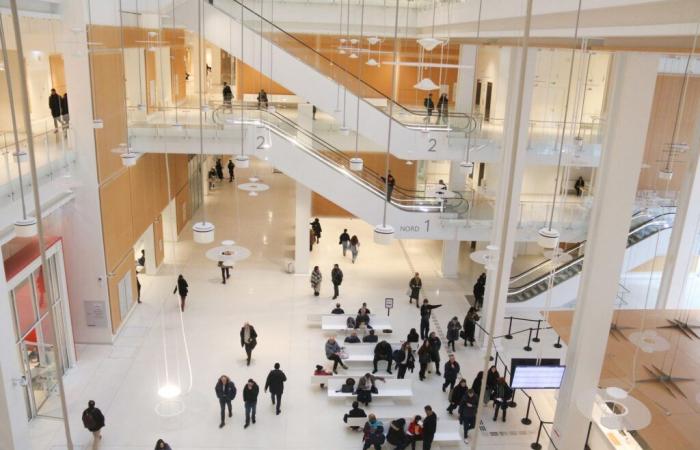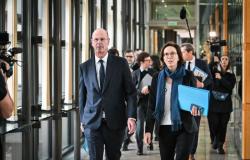Nicolas Sarkozy must respond from Monday and for four months, alongside three former ministers, to accusations of illegal financing of his 2007 campaign by Muammar Gaddafi’s Libya.
A new trial for Nicolas Sarkozy: the former French president must answer from Monday and for four months, alongside three former ministers, to accusations of illegal financing of his 2007 campaign by Muammar Gaddafi’s Libya.
The former head of state (2007-2012), aged 69, will be present for the opening of his trial at 12:30 GMT before the Paris court, assures his entourage, who say he is “combative” and “determined » to prove his innocence in the face of what he always described as a “fable”.
The rest after this ad
He is accused, while he was Minister of the Interior, of having made a “pact of corruption” with the wealthy Libyan dictator who fell in 2011, so that he would “financially support” his accession to the French presidency.
The rest after this ad
Tried for corruption, concealment of embezzlement of public funds, illegal campaign financing and criminal conspiracy, Nicolas Sarkozy faces 10 years in prison and a fine of 375,000 euros, as well as deprivation of civil rights (therefore ineligibility) of up to at five years old.
“I am convinced of guilt” drawn “from hearings, witnesses, tracing of financial flows, elements of mutual assistance which were provided to us by 21 countries”, declared the financial prosecutor Jean-François Bohnert Monday morning on BFMTV / RMC.
The rest after this ad
The rest after this ad
“Our work is not political work,” he said: “we only have one compass, and that is the law.”
This is the fifth trial in five years of the former right-wing president.
He was sentenced at first instance and on appeal for illegal campaign financing to one year’s imprisonment, including six months under an electronic bracelet, an unprecedented sanction for a former head of state in France. He filed an appeal before the Court of Cassation (the highest court in the French legal order) in this case linked to excessive spending during his lost 2012 presidential campaign.
Mr Sarkozy does not yet wear an electronic bracelet – this may take several weeks.
The trial will begin with the appeal of the 12 defendants, civil parties and witnesses, before procedural questions, which should occupy the court throughout the first week.
The hearings will take place on Monday, Wednesday and Thursday afternoons, until April 10. According to his entourage, Nicolas Sarkozy will be present at each hearing during the first month, devoted to suspicions of financing. Additional aspects will be discussed in the following weeks.
“He will fight the artificial construction imagined by the prosecution. There is no Libyan financing of the campaign,” declared his lawyer, Me Christophe Ingrain.
Nicolas Sarkozy disputes everything: for him, the Libyans’ accusations are only “revenge” explained by his active support for the Libyan rebels at the time of the Arab Spring which brought down Mr. Gaddafi, killed in October 2011.
The prosecution believes that the “corruption pact” was established in the fall of 2005 in Tripoli, under the tent of Muammar Gaddafi, known for being very generous with his foreign visitors.
“Clue bundle”
Nicolas Sarkozy was then an ambitious and highly publicized minister thinking about the presidential election. His visit to Libya was officially devoted to illegal immigration.
The prosecution was unable to establish an exact total amount of the alleged financing. But after 10 years of investigation, a “cluster of clues” convinced the investigating judges.
They relied in particular on the declarations of seven former Libyan dignitaries, the discreet trips to Libya of Claude Guéant and Brice Hortefeux, suspicious transfers or the notebooks of the former Libyan Minister of Oil Choukri Ghanem, found drowned in the Danube in 2012.
The supposed counterparts? First an international rehabilitation: Gaddafi will be welcomed with great fanfare in 2007 by Nicolas Sarkozy, newly elected president, during a controversial visit to Paris, the first in three decades.
But also the signing of major contracts and a legal helping hand to Abdallah Senoussi, director of Libyan intelligence sentenced to life imprisonment in his absence in France for his role in the attack on the UTA DC-10 in 1989, which cost the lives of 170 people including 54 French. Around twenty relatives are civil parties to the trial.
Among the defendants are former Budget Minister Eric Woerth, campaign treasurer. As well as two shadowy men, experienced in parallel international negotiations: the discreet businessman Alexandre Djouhri and the sulphurous and versatile Ziad Takieddine – today on the run in Lebanon.
Three transfers from the Libyan authorities for a total of 6 million euros were found on the latter’s account and he described “suitcases” given to Claude Guéant, containing “large bills”.






